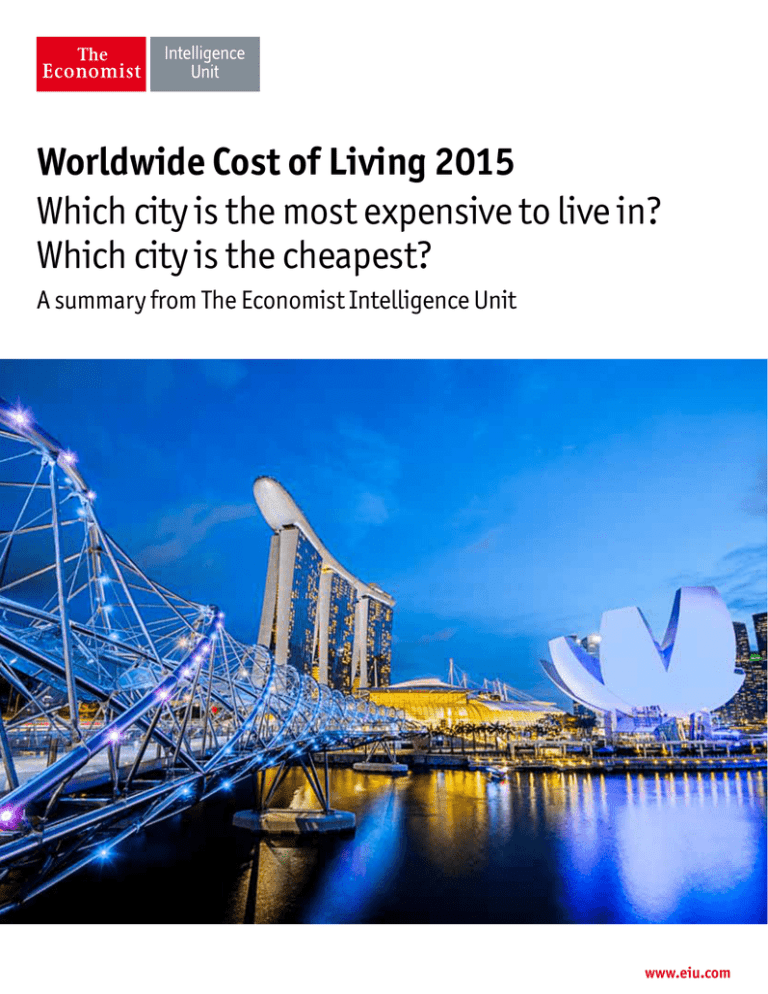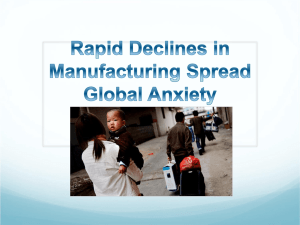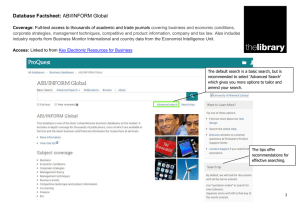Worldwide Cost of Living 2015 Which city is the most expensive to
advertisement

Worldwide Cost of Living 2015 Which city is the most expensive to live in? Which city is the cheapest? A summary from The Economist Intelligence Unit www.eiu.com Worldwide Cost of Living 2015 Which city is the most expensive to live in? Which city is the cheapest? The findings of the latest Worldwide Cost of Living Survey An unchanged top five Singapore remains the world’s most expensive city as the latest ranking delivers no changes among the top five cities. This façade of relative stability is deceptive, however, and it is extremely rare for an identical top five to be achieved in ranking the global cost of living. In fact, midway through 2014 Singapore lay in fourth position, and the reassertion of an identical top five comes with a stronger US dollar and weaker euro pushing euro zone cities back down later in 2014. The subsequent unpegging of the Swiss franc from the euro means that, at today’s exchange rates, Zurich and Geneva would be the world’s most expensive cities, with indices of 136 and 130 respectively. Despite topping the ranking, Singapore still offers relative value in some categories, especially compared with its regional peers. For general basic groceries, Singapore is only 11% more expensive than New York. This compares with 49% more in Seoul, 43% in Tokyo and 31% in Hong Kong, implying that value for money can be found by those who seek it. However, Singapore remains consistently expensive in other categories. It is the joint most expensive place in the world alongside Seoul to buy clothes, with the malls of Orchard Road offering a price premium that is over 50% higher than in New York. Most significantly, Singapore’s complex Certificate of Entitlement fee system makes car prices excessive, and transport costs in Singapore are almost three times higher than in New York. The ten most expensive cities in the world Country City WCOL index (New York=100) Rank Rank movement Singapore Singapore 129 1 0 France Paris 126 2 0 Norway Oslo 124 3 0 Switzerland Zurich 121 4 0 Australia Sydney 120 5 0 Australia Melbourne 118 6 0 Switzerland Geneva 116 7 -1 Denmark Copenhagen 115 8 2 Hong Kong Hong Kong 113 9 4 South Korea Seoul 113 9 6 Asia gets pricier as Europe remains expensive A marked increase in the cost of living in many Asian locations has seen Asian cities make up half of the ten most expensive in the world, with Western European locations making up the other half. But even in this relationship, the dynamics have changed over time. Weak inflation, or deflation and a devaluation of the Japanese yen, have pushed the cities of Tokyo and Osaka further down the ranking. Both cities have traditionally been the two most expensive globally over the past 20 years, but they 1 © The Economist Intelligence Unit Limited 2015 Worldwide Cost of Living 2015 Which city is the most expensive to live in? Which city is the cheapest? now lie in 11th and 16th place respectively. Conversely, Seoul, which was ranked 50th five years ago, is now among the ten most expensive. The cost of living in Seoul is now on a par with that of Hong Kong, which was once (in 2003) the third most expensive city surveyed. Equally, the long-term rise in the relative cost of living in Australia, driven by sustained strengthening of the Australian dollar, has cemented the positions of cities like Sydney and Melbourne as top-ten staples. This comes despite the fact that ten years ago both cities were cheaper than New York. Weak confidence in the euro means that Paris is the only euro zone city in the top ten. Despite a weakening currency, Paris remains structurally extremely expensive to live in, with only alcohol and tobacco offering value for money compared with other European cities. Paris is joined among the most expensive European cities by Oslo, Zurich, Geneva and Copenhagen, perhaps reflecting that non-euro zone cities have become pricier in relation to their neighbours. When looking at the most expensive cities by category, it is interesting to note that Asian cities tend to form the priciest locations for general grocery shopping, with Seoul becoming the most expensive location for everyday food items. However, European cities tend to be priciest in the recreation and entertainment categories, with Zurich the most expensive, perhaps reflecting a greater premium on discretionary income. New York continues to rise A stronger dollar and localised inflation mean that New York is continuing to become pricier compared with other locations. With New York set as the index standard at 100, it is difficult to chart progress without looking at its ranking position and the movement of cities in relation to it. Over the past 12 months the city has moved up from 26th place in the ranking to 22nd. While this reflects steady progress over the past two to three years, it disguises a rollercoaster ride for the Big Apple, which was regularly ranked among the ten most expensive cities, peaking in sixth place between 2000 and 2002, before falling as far down the ranking as 49th in 2011. Some 79 cities have seen negative index movement compared with New York in the last year, with 25 hailing from Western Europe, which highlights the difference in recovery between the two regions of North America and Europe. 2 © The Economist Intelligence Unit Limited 2015 Worldwide Cost of Living 2015 Which city is the most expensive to live in? Which city is the cheapest? Price now and then top ten cities City Average US$ price 1kg loaf of bread Average US$ price 1 bottle table wine (750ml) Average US$ price 20 branded cigarettes Average US$ price 1 litre unleaded petrol Singapore Paris Oslo Zurich Sydney Melbourne Geneva Copenhagen Hong Kong Seoul Current $3.54 $8.83 $6.02 $5.96 $4.96 $4.22 $7.48 $4.18 $4.31 $13.91 Last year $3.36 $8.44 $5.91 $6.19 $4.65 $4.43 $6.38 $4.82 $4.05 $11.15 5 years $2.88 $9.23 $5.65 $5.48 $3.53 $4.62 $5.22 $5.35 $4.48 $8.39 10 years $3.04 $5.81 $3.84 $5.55 $2.59 $2.46 $4.81 $2.98 $3.17 $4.47 Current $25.24 $12.27 $16.37 $15.93 $23.63 $23.32 $8.49 $12.66 $15.78 $27.66 Last year $25.04 $11.45 $17.13 $15.82 $22.58 $22.28 $8.39 $13.70 $14.18 $22.25 5 years $22.80 $9.36 $16.31 $14.49 $19.73 $19.45 $7.73 $13.00 $14.06 $18.53 10 years $16.04 $6.88 $13.50 $8.85 $13.19 $12.05 $7.29 $9.45 $14.79 $16.81 Current $10.32 $9.09 $15.42 $9.46 $18.50 $18.96 $9.57 $7.65 $7.23 $2.69 Last year $9.55 $8.95 $15.44 $8.83 $15.75 $15.50 $8.72 $7.35 $6.70 $2.29 5 years $8.15 $7.57 $11.99 $6.54 $8.40 $8.52 $6.54 $6.31 $5.08 $2.01 10 years $5.59 $5.66 $9.13 $4.09 $5.92 $5.57 $4.09 $5.05 $4.23 $2.17 Current $1.76 $2.40 $2.28 $2.07 $1.43 $1.42 $2.08 $2.07 $2.04 $1.72 Last year $1.73 $2.50 $2.41 $2.06 $1.35 $1.35 $1.96 $2.18 $2.03 $1.75 5 years $1.19 $2.07 $2.03 $1.52 $1.05 $1.06 $1.54 $1.91 $1.81 $1.48 10 years $0.86 $1.27 $1.44 $1.18 $0.76 $0.71 $1.16 $1.43 $1.54 $1.22 A year of currency fluctuation Despite the deceptive stability of the most expensive cities, there have been some significant drivers of change that have had an impact on the cost-of-living ranking, with further changes still to come. A number of markets have seen significant currency instability, with falling oil prices also adding a deflationary element to pricing. In Venezuela the adoption of multiple exchange rates has made pricing Caracas almost impossible. The official exchange rate of around BsF6.3:US$1 has become unsustainable in the face of rampant local inflation and a parallel black market exchange rate that trades at around BsF190:US$1. For this survey an alternative official rate, known as the Siccad II, was The ten cheapest cities in the world 3 Country City WCOL index (New York=100) Rank Rank movement Pakistan Karachi 44 132 -2 India Bangalore 44 132 n/a* Venezuela Caracas 45 130 -124 India Mumbai 45 130 1 India Chennai 46 129 n/a* India New Delhi 48 128 1 Iran Tehran 49 126 -61 Syria Damascus 49 126 1 Nepal Kathmandu 51 125 2 Algeria Algiers 52 124 2 *Chennai and Bangalore are being ranked for the first time © The Economist Intelligence Unit Limited 2015 Worldwide Cost of Living 2015 Which city is the most expensive to live in? Which city is the cheapest? adopted, which was enough to push Caracas down from a top-ten city last year to a bottom-five city now. This fall will be compounded by a further decoupling of the various official rates in operation announced in February. A number of other countries have also seen significant currency declines, often accompanied by high levels of inflation, with Argentina, Russia, Ukraine and Iran all experiencing falls. In the case of Argentina, price inflation has done much to offset the cost-of-living decline caused by currency weakness. In Russia the collapse of the rouble is ongoing and, if the cost-of-living index applied to Moscow and St Petersburg were recalculated to reflect current exchange rates, both cities would be among the world’s cheapest. Cheapest cities reflect low costs in South Asia The cheapest cities in the ranking have a familiar feel to them, both in terms of geography and consistency. While Asia is home to some of the world’s most expensive cities, the region is also home to many of the world’s cheapest cities. Within Asia, the best value for money is in the Indian subcontinent (defined as India, Pakistan, Bangladesh, Nepal and Sri Lanka). Karachi and Bangalore are the joint cheapest locations in the survey, and five of the six cheapest cities surveyed hail from Pakistan and India. The current survey has included two additional cities in India, Bangalore and Chennai, with both also reflecting the structurally low prices enjoyed on the subcontinent. Although India has been tipped for future growth, much of this is driven by its large population and the untapped potential within the economy. Income inequality means that low wages proliferate, driving down household spending and creating many tiers of pricing that keep spending per head low. This, combined with a cheap and plentiful supply of goods into cities from rural producers with short supply chains, as well as government subsidies on some products, has kept prices down, especially by Western standards. Cheap but not always cheerful But this may not tell the full picture. As mentioned, the presence of Caracas among the cheapest cities comes as a reflection of a revised exchange rate that has seen the city fall by 124 places in the ranking. If black-market exchange rates were applied, Caracas would be significantly cheaper than any other location in the world. A similar collapse has occurred in Iran, where exchange-rate revisions have prompted a 61-place fall in the ranking. Equally, the collapsing rouble means that a rebasing of indices at current exchange rates would put Moscow and St Petersburg among the bottom ten ranked cities. The Indian subcontinent may be structurally cheap, but an increasing number of locations are also becoming cheaper because of the impact of significant political or economic disruption. This also means that there is a considerable element of risk in some of world’s cheapest cities. Karachi, Kathmandu, Algiers, Caracas and Tehran have faced well-documented economic, political and security challenges. 4 © The Economist Intelligence Unit Limited 2015 Worldwide Cost of Living 2015 Which city is the most expensive to live in? Which city is the cheapest? Prices. Now and then - Bottom 10 cities Average US$ price 1kg loaf of bread Average US$ price 1 bottle table wine (750ml) City Algiers Kathmandu Tehran Damascus New Delhi Chennai Caracas Mumbai Karachi Bangalore Current $2.43 $1.69 $2.36 $1.66 $1.07 $0.93 $3.36 $1.13 $1.72 $1.04 Last year $2.44 $1.26 $3.57 $1.88 $1.05 n/a $11.02 $0.91 $1.59 n/a 5 years $2.09 $0.93 $0.42 $1.99 $0.77 n/a $7.63 $0.92 $1.51 n/a 10 years $3.28 n/a $0.24 $2.53 $0.67 n/a $2.45 $0.70 $1.81 n/a Current $11.55 $24.02 $0.00 $9.10 $17.70 $15.49 $6.71 $23.06 $14.19 $15.72 Last year $11.40 $18.98 $0.00 $6.47 $16.33 n/a $22.41 $20.59 $13.73 n/a 5 years $7.21 $14.70 $0.00 $3.66 $32.73 n/a $19.80 $27.10 $10.25 n/a 10 years $4.98 n/a $0.00 $2.90 $36.71 n/a $2.60 $26.72 $10.20 n/a Current $4.95 $1.88 $2.97 $3.03 $3.10 $3.15 $1.43 $2.85 $1.60 $2.82 $4.89 $1.53 $4.99 $1.58 $2.20 n/a $6.36 $1.53 $1.56 n/a Average Last year US$ price 20 branded 5 years cigarettes 10 years Average US$ price 1 litre unleaded petrol 5 $4.12 $1.26 $2.01 $2.83 $2.00 n/a $6.05 $1.70 $1.25 n/a $3.46 n/a $1.47 $1.42 $1.48 n/a $0.85 $1.58 $1.22 n/a Current $0.28 $1.33 $0.33 $0.78 $1.14 $1.19 $0.00 $1.30 $1.12 $1.28 Last year $0.28 $1.24 $0.51 $0.78 $1.14 n/a $0.02 $1.21 $1.14 n/a 5 years $0.31 $1.00 $0.12 $0.87 $0.93 n/a $0.05 $1.02 $0.85 n/a 10 years $0.31 n/a $0.02 $0.48 $0.79 n/a $0.04 $0.89 $0.63 n/a © The Economist Intelligence Unit Limited 2015 Worldwide Cost of Living 2015 Which city is the most expensive to live in? Which city is the cheapest? Background: about the survey The Worldwide Cost of Living is a bi-annual (twice yearly) Economist Intelligence Unit survey that compares more than 400 individual prices across 160 products and services. These include food, drink, clothing, household supplies and personal care items, home rents, transport, utility bills, private schools, domestic help and recreational costs. The survey itself is a purpose-built Internet tool designed to help human resources and finance managers calculate cost-of-living allowances and build compensation packages for expatriates and business travellers. The survey incorporates easy-to-understand comparative cost-of-living indices between cities. The survey allows for city-to-city comparisons, but for the purpose of this report all cities are compared with a base city of New York, which has an index set at 100. The survey has been carried out for more than 30 years. Methodology More than 50,000 individual prices are collected in each survey, conducted each March and September and published in June and December. Economist Intelligence Unit researchers survey a range of stores: supermarkets, mid-priced stores and higher-priced speciality outlets. Prices reflect costs for more than 160 items in each city. These are not recommended retail prices or manufacturers’ costs; they are what the paying customer is charged. Prices gathered are then converted into a central currency (US dollars) using the prevailing exchange rate and weighted in order to achieve comparative indices. The cost-of-living index uses an identical set of weights that is internationally based and not geared toward the spending pattern of any specific nationality. Items are individually weighted across a range of categories and a comparative index is produced using the relative difference by weighted item. For more information on the Worldwide Cost of Living Survey http://www.worldwidecostofliving.com 6 © The Economist Intelligence Unit Limited 2015 Purchase the complete Worldwide Cost of Living service The Worldwide Cost of Living survey enables human resources line managers and expatriate executives to compare the cost of living in 140 cities in 93 countries and calculate fair compensation policies for relocating employees. The survey gathers detailed information on the cost of more than 160 items-from food, toiletries and clothing to domestic help, transport and utility bills--in every city. More than 50,000 individual prices are collected in each survey round, which take place in March and September, and surveys are updated each June and December. A cost-of-living index is calculated from the price data to express the difference in the cost of living between any two cities. Companies can then apply this index to an executive’s spendable income to reach a fair cost of living allowance. The purpose of a cost of living allowance is to reimburse employees for excess living costs resulting from a foreign assignment. Payment is based on the assumption that an expatriate has a right to live at the assignment site in the same manner and with the same kind of goods and services he would find at home. A salary calculator on the site enables you to make these calculations within seconds. The survey also contains price information for other cost categories, helping you create separate allowances to cover housing costs, school fees and business trips. In addition, background information is provided on each city’s housing market and on local disposable income levels. Who subscribes to the survey? Remuneration is not the sole preserve of HR directors, personnel managers or vice presidents of people. Our list of buyers reflects this, increasingly so as people management responsibilities spread throughout organisations. Clients include heads of research, accountants and strategy advisors as well as CEOs, CFOs and, of course, the HR director. It is also possible conduct one-off surveys of cities not included in the list above or of a selection of items not included in the normal basket. For more details of the opportunities for custom surveys, please contact the Economist Intelligence Unit. For more information go to www.worldwidecostofliving.com or Should you wish to speak to a sales representative please telephone us: Americas: +1 212 698 9717 Asia: +852 2585 3888 Europe, Middle East & Africa: +44 (0)20 7576 8181 7 © The Economist Intelligence Unit Limited 2015 Access analysis on over 200 countries worldwide with the Economist Intelligence Unit T he analysis and content in our reports is derived from our extensive economic, financial, political and business risk analysis of over 203 countries worldwide. You may gain access to this information by signing up, free of charge, at www.eiu.com. Click on the country name to go straight to the latest analysis of that country: G8 Countries l Canada l Germany l Japan l United Kingdom l France l Italy l Russia l United States of America l Russia l India l China l Colombia l Vietnam l Turkey l Indonesia l Egypt l South Africa BRIC Countries l Brazil CIVETS Countries Or view the list of all the countries. Further reports are available from Economist Intelligence Unit and can be downloaded at www.eiu.com Should you wish to speak to a sales representative please telephone us: Americas: +1 212 698 9717 Asia: +852 2585 3888 Europe, Middle East & Africa: +44 (0)20 7576 8181 8 © The Economist Intelligence Unit Limited 2015 Access analysis and forecasting of major industries with the Economist Intelligence Unit I n addition to the extensive country coverage the Economist Intelligence Unit provides each month industry and commodities information is also available. The key industry sectors we cover are listed below with links to more information on each of them. Automotive Analysis and five-year forecast for the automotive industry throughout the world providing detail on a country by country basis. Commodities This service offers analysis for 25 leading commodities. It delivers price forecasts for the next two years with forecasts of factors influencing prices such as production, consumption and stock levels. Analysis and forecasts are split by the two main commodity types: “Industrial raw materials” and “Food, feedstuffs and beverages”. Consumer goods Analysis and five-year forecast for the consumer goods and retail industry throughout the world providing detail on a country by country basis. Energy Analysis and five-year forecast for the energy industries throughout the world providing detail on a country by country basis. Financial services Analysis and five-year forecast for the financial services industry throughout the world providing detail on a country by country basis. Healthcare Analysis and five-year forecast for the healthcare industry throughout the world providing detail on a country by country basis. Technology Analysis and five-year forecast for the technology industry throughout the world providing detail on a country by country basis. 9 © The Economist Intelligence Unit Limited 2015 Meet your specific research needs with our Custom Research service S uccessful strategies leave nothing to chance. That is why business leaders throughout the world commission custom research from the Economist Intelligence Unit to enrich their insight for sharper business decisions. EIU Custom Research was established in 2004 to provide a superior level of knowledge to clients who need a more thorough understanding of current markets and growth opportunities at a strategic or operational level. This specialist service delivers bespoke business intelligence that is deeper and broader than the published reports and subscription-based services for which we are renowned. Benchmarking We can provide a detailed evaluation of competitors operating in a market you are considering for expansion, evaluate local human capital, the overseas talent market, labour market conditions and how local regulations will affect your organisation—positively or negatively—to help you to prioritise markets for expansion and pinpoint hidden opportunities for growth and profitability. Find out more by reading this case study. Country analysis We can provide you with an in-depth understanding of specific political and economics issues and forecasts including scenario analysis.You may be interested in business environment analysis or crosscountry benchmarking—our global reach and ability to focus on your business needs within a crosscountry framework is unparalleled. Find out more by reading this case study. Forecasting We are able to help you to understand where you are most likely to find the greatest demand for your products or services—now, and over time. Our unrivalled database of over 200 countries, combined with our ability to offer more granular research, allows us to do this effectively. Find out more by reading this case study. Indexing Our expertise is not limited to business or government applications. We can combine our analysis and modelling capabilities with access to global academic experts to develop highly customised indexes that highlight particular factors that your organisation needs to be aware of. Find out more by reading this case study. Market sizing We can help you to determine the best markets in which to expand, how to expand effectively, and what your organisation needs to be ready to manage this expansion. We do this by drawing from our peerless databases of macroeconomic and demographic analysis and forecasting, combined with sophisticated econometric modelling services. Find out more by reading this case study. 10 © The Economist Intelligence Unit Limited 2015 Meet your specific research needs with our Custom Research service Product demand We can identify where the greatest demand for your product—and the greatest opportunity for expansion—may lie through our access to industry leaders, combined with our expert forecasting and analysis capabilities. Find out more by reading this case study. Risk analysis We can identify obstacles your company may face from exposure to new markets and new opportunities in a comparative framework that sets unfamiliar markets and situations alongside places and activities you already know. We can provide country-specific, operational and financial risk ratings to help you to make informed decisions on a number of different indicators, including early warning of possible market and industry threats in areas such as security, tax policy, supply chain, regulatory, creditworthiness and labour markets. Find out more by reading this case study. Visit our website at www.eiu.com/research Or Should you wish to speak to a sales representative please telephone us: Americas: +1 212 698 9717 Asia: +852 2585 3888 Europe, Middle East & Africa: +44 (0)20 7576 8181 11 © The Economist Intelligence Unit Limited 2015 Media Enquiries for the Economist Intelligence Unit Europe, Middle East & Africa Asia Pacific (excluding China) Grayling London Roisin Miller +44 (0) 207 592 7922 +44 (0) 795 078 3428 eiu-international@grayling.com MHP Communications Rhonda Taylor Tel: +852 3114 6335 rhonda.taylor@mhpc.com Americas Grayling New York Gina Sorice Tel: +1 646 284 9414 eiu-international@grayling.com 12 China Grayling China Sissi Jiang +86 (10) 8535 0762 +86 137 1792 8681 sissi.jiang@grayling.com © The Economist Intelligence Unit Limited 2015 While every effort has been taken to verify the accuracy of this information, The Economist Intelligence Unit Ltd. cannot accept any responsibility or liability for reliance by any person on this report or any of the information, opinions or conclusions set out in this report. Cover image - © joesayhello/Shutterstock LONDON 20 Cabot Square London E14 4QW United Kingdom Tel: (44.20) 7576 8000 Fax: (44.20) 7576 8500 E-mail: london@eiu.com NEW YORK 750 Third Avenue 5th Floor New York, NY 10017 United States Tel: (1.212) 554 0600 Fax: (1.212) 586 1181/2 E-mail: newyork@eiu.com HONG KONG 6001, Central Plaza 18 Harbour Road Wanchai Hong Kong Tel: (852) 2585 3888 Fax: (852) 2802 7638 E-mail: hongkong@eiu.com GENEVA Rue de l’Athénée 32 1206 Geneva Switzerland Tel: (41) 22 566 2470 Fax: (41) 22 346 93 47 E-mail: geneva@eiu.com



